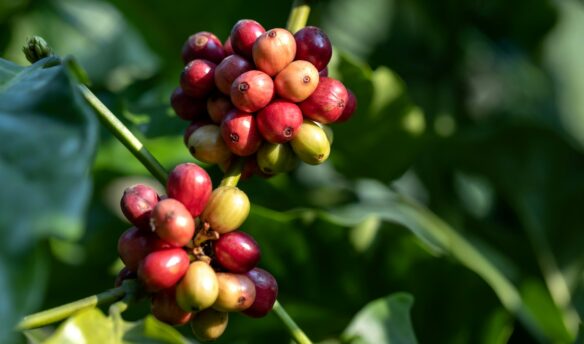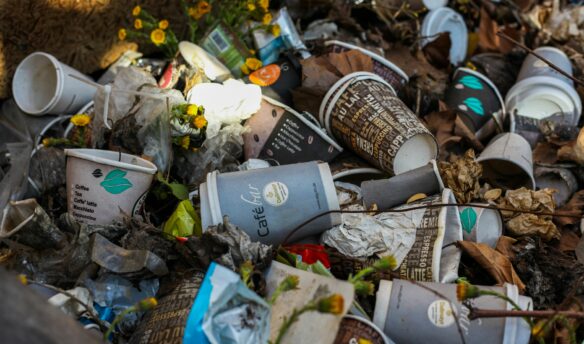Fittingly for the first Coffee News Club of 2023, let’s look at some coffee health stories. Plus, which brew method has the smallest carbon footprint?
📩 Get the latest coffee trends in your inbox weekly—subscribe here.
‘For Those With High Blood Pressure, Two Cups Of Coffee Might Be Too Much’ – via Sprudge
We’ve all felt the effects of too much coffee, from sleeplessness to the jitters. But for those with high blood pressure, drinking two or more cups per day could be genuinely dangerous.
A new study published in the Journal of the American Heart Association examined the impacts of coffee and green tea consumption on cardiovascular disease (CVD) mortality in people with severe hypertension. Researchers followed almost 19,000 participants aged between 40 and 79 for 19 years as part of the Japanese Collaborative Cohort Study for Evaluation of Cancer Risk, looking at data provided through health examinations and self-reported lifestyle and diet questionnaires.
The analysis found that drinking two or more cups of coffee per day was associated with double the risk of CVD death in people with severe hypertension compared to those who did not drink coffee. Drinking just one coffee per day—or any amount of green tea—was not associated with increased mortality risk for any participants.
“These findings may support the assertion that people with severe high blood pressure should avoid drinking excessive coffee,” said lead author Professor Hiroyasu Iso of the Osaka University Graduate School of Medicine. “Because people with severe hypertension are more susceptible to the effects of caffeine, caffeine’s harmful effects may outweigh its protective effects and may increase the risk of death.”
It’s worth noting the use of “may” here because this study didn’t account for blood pressure changes throughout its nearly two-decade span, and researchers are always cautious when studies use self-reported data.
As we will see, scientists are looking to solve the latter issue.
‘How Much Coffee Do You Drink? The Correct Answer May Be in Your Pee’ – via Daily Coffee News
As you’ve probably noticed, many health-related studies rely on self-reported data, or participants monitoring their habits and reporting back to researchers. The issue of self-reporting afflicts nearly all coffee-health studies because such data can be unreliable and difficult to verify. This is especially true of self-reported dietary data because people are likely to underreport or otherwise fudge their answers on such questionnaires.
Think about it: how many cups of coffee do you drink every day? Is it always the same? How much sugar and cream do you add? Truthfully, how much? How was the coffee brewed? Do you always use the same method? And anyway, what counts as a cup?
Without accurate consumption data, coffee health studies that rely on self-reporting will always be fundamentally unreliable.
Researchers in Germany hope to resolve this problem by identifying three new biomarkers found in urine (no snickering at the back) that could measure coffee consumption more accurately. These biomarkers come from chemicals not usually found in most foods but are formed in large quantities during coffee roasting.
Although scientists had previously determined biomarker candidates, research had yet to progress because they couldn’t identify their molecular structures.
This new study, published in the journal Food Chemistry, examined the urine samples of six volunteers after they consumed 400ml of coffee. Using high-performance analytical technologies, the study identified three biomarkers and, for the first time, clearly determined their chemical structures.
“Our findings help advance biomarker research,” said Dr. Roman Lang of the Leibniz Institute for Food Systems Biology at the Technical University of Munich. Because many health-related studies rely on self-reported data, Dr. Lang hopes biomarkers can be used in tandem with future coffee research. “Complementary studies would therefore be desirable in which coffee consumption could be objectively verified using biomarkers,” Dr. Lang said, “in order to determine the health value of coffee even more reliably.”
It’s exciting that in the future, we might one day finally get a conclusive answer to the question, “Is coffee good for you?” Although it’s slightly less appealing that the explanation might well come down to pee.
More News
‘The First 2023 Coffee Championships Qualifying Event Heads To Baltimore’ – via Sprudge
‘Brazil’s The Coffee Targets 350 Stores by the End of 2023’ – via World Coffee Portal
‘% Arabica Enters Canada with Snowy White Toronto Flagship’ – via Daily Coffee News
‘West Nile Farmers to Earn Extra Profit for Producing Quality Coffee’ – via Monitor
‘Coffee Science Foundation and Ohio State Team Up for Sweet Science’ – via Daily Coffee News
The Week in Coffee Unionizing
- Prosecutors with the National Labor Relations Board (NLRB) have concluded that Starbucks illegally forced out union leader Jaz Brisack. Brisack resigned in September after alleging the company engaged in discriminatory changes to their scheduling policy. The NLRB concluded that Starbucks effectively forced Brisack to resign in retaliation for her activism, a charge the company denies.
- The NLRB prosecutors also allege that Starbucks refused to negotiate with 21 recently unionized cafes in Washington and Oregon, writing that the company “has been failing and refusing to bargain collectively.” Although dozens of anti-union complaints have been issued across the country, this is the first to accuse the company of unfair bargaining at multiple stores. Starbucks has repeatedly said that it adheres to the law and calls claims of anti-union activity “categorically false.”
- Two coffee chains in Louisville, KY, have been forced to change their tip-pooling process and issue backpay to workers. Union organizers alerted the Department of Labor that store managers at Sunergos Coffee and Heine Brothers’ Coffee were participating in tip pools. “It definitely felt like we’re standing in our own power as workers. Because without a union, or without standing together in general, we wouldn’t have had an idea of how to do it,” said Sunergos employee Bekah Ryherd. The Sunergos union vote will take place on January 11, while Heine Brothers’ workers successfully voted to unionize in September.
- Gen Z is the most pro-union generation to date. Economics plays a key role—many millennials and Gen Zers cannot afford basic expenses like rent, health insurance, and student loan payments. “I think it’s pretty obvious that the younger generation is more progressive than any other generation before,” Starbucks barista Stephen Noble said. “We want to stand up for what we deserve—or what we think we deserve—rather than just settling to work for a corporation.”
The Week in Corporate Coffeewashing
It can be hard to know how much impact your daily coffee brewing has on the planet because so many variables are at play. Before it even gets to you, consider: where and how was the coffee grown? How was it processed, shipped, and roasted? What brew ratio do you use, and how much water do you boil? How is your electricity generated, and do you compost your waste?
Looking at this incomplete list of questions, maybe it’s impossible to fully assess the environmental impact of coffee. However, that hasn’t stopped researchers from trying to figure it out. Let’s look at two recent pieces that came to two different conclusions.
Researchers in Canada compared the carbon footprints of various brew methods—”traditional filter,” capsules, French press, and instant—and found that filter coffee had the most significant impact. The study determines that filter uses more coffee and requires more electricity to heat water and keep coffee warm. The authors don’t clarify what “traditional filter” means. However, from later references to a hot plate and “coffee maker,” it appears they’re referring to a drip coffee machine rather than a pour over device.
“When consumers use the recommended amounts of coffee and water,” the authors write, “soluble coffee appears to be the most environmentally friendly option.” According to the study, this is due to the small amount of coffee used per cup, lower electricity use, and the lack of disposal of coffee waste.
The researchers point to brewing methods that consume more coffee and water as the primary culprits when it comes to emissions. They also state that “consumers should also be aware of the capsule recycling options in the city where they live to avoid it getting sent to a landfill instead of a recycling facility.”
This leads us to the other report, which scrutinizes capsule carbon footprint research. The article looks closely at waste in coffee pod brewing, finding that capsule recyclability claims are murky at best.
“The market for coffee capsules is growing,” the article states, “and waste grows with it.” The annual global footprint of capsule waste is over half a million metric tons. Although companies are developing new materials to avoid plastic, “progress to ensure that coffee capsules don’t contribute to more pollution is still moving at a glacial pace.”
Plastic coffee pods are too small to be easily sorted by most recycling plants, although companies still advertise them as recyclable. Keurig, who gave us the now-ubiquitous K-cup, has been fined and settled lawsuits over misleading recyclability labeling. Nespresso’s aluminum pods are marketed as more sustainable because of the metal’s infinite recyclability, but the article points out that the company’s claims of a 32% global recycling rate can’t be independently verified (and that rate means 12,600 tons of aluminum from coffee pods ends up in landfill annually).
Pod-producing companies and the consultancies they employ point to coffee production as where the bulk of emissions lie. However, scientific literature is divided on the issue. Some studies point to farming, brewing, and packaging as the main culprit, while other research says capsules have a bigger footprint. And some scientists say there’s not enough data to assert any claim.
In the end, putting the onus on the consumer to research the options and dispose of everything correctly has let big companies escape scrutiny. “It’s not correct to blame consumers for emissions or wastage,” said Piotr Barczak, a circular economy expert at the European Environmental Bureau. “These companies benefit from a lack of governance, [weak] environmental policies, a lack of enforcement, and they make huge profits — at the expense of both the environment and people.”
Beyond the Headlines
‘What Is A Q Grader For Coffee?’ by Liz Clayton
‘Specialty Coffee, But Make It Fun’ by Bettina Makalintal
‘In 2023, Get Closer To Your Coffee’ by Ashley Rodriguez
‘Coffee’s Journey from Culinary Curiosity to Colonized Commodity’ by Jess Carlan
‘Trial and Error: Going Organic in Guatemala’ by Fionn Pooler
Coffee News Club is written by Fionn Pooler and the Fresh Cup editorial team.
















